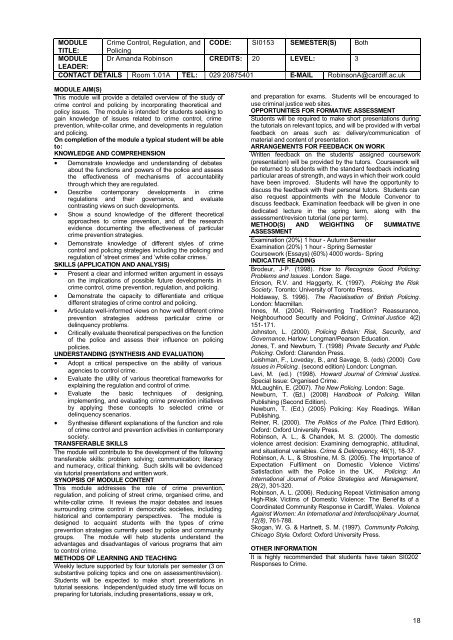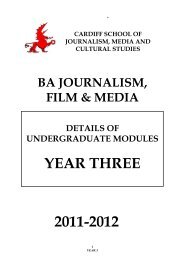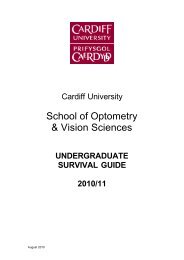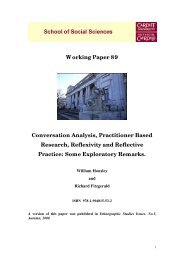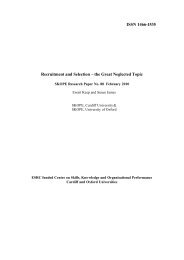Year 3 Catalogue 2011-2012 - Cardiff University
Year 3 Catalogue 2011-2012 - Cardiff University
Year 3 Catalogue 2011-2012 - Cardiff University
Create successful ePaper yourself
Turn your PDF publications into a flip-book with our unique Google optimized e-Paper software.
MODULE Crime Control, Regulation, and CODE: SI0153 SEMESTER(S) Both<br />
TITLE: Policing<br />
MODULE Dr Amanda Robinson CREDITS: 20 LEVEL: 3<br />
LEADER:<br />
CONTACT DETAILS Room 1.01A TEL: 029 20875401 E-MAIL RobinsonA@cardiff.ac.uk<br />
MODULE AIM(S)<br />
This module will provide a detailed overview of the study of<br />
crime control and policing by incorporating theoretical and<br />
policy issues. The module is intended for students seeking to<br />
gain knowledge of issues related to crime control, crime<br />
prevention, white-collar crime, and developments in regulation<br />
and policing.<br />
On completion of the module a typical student will be able<br />
to:<br />
KNOWLEDGE AND COMPREHENSION<br />
• Demonstrate knowledge and understanding of debates<br />
about the functions and powers of the police and assess<br />
the effectiveness of mechanisms of accountability<br />
through which they are regulated.<br />
• Describe contemporary developments in crime<br />
regulations and their governance, and evaluate<br />
contrasting views on such developments.<br />
• Show a sound knowledge of the different theoretical<br />
approaches to crime prevention, and of the research<br />
evidence documenting the effectiveness of particular<br />
crime prevention strategies.<br />
• Demonstrate knowledge of different styles of crime<br />
control and policing strategies including the policing and<br />
regulation of ‘street crimes’ and ‘white collar crimes.’<br />
SKILLS (APPLICATION AND ANALYSIS)<br />
• Present a clear and informed written argument in essays<br />
on the implications of possible future developments in<br />
crime control, crime prevention, regulation, and policing.<br />
• Demonstrate the capacity to differentiate and critique<br />
different strategies of crime control and policing.<br />
• Articulate well-informed views on how well different crime<br />
prevention strategies address particular crime or<br />
delinquency problems.<br />
• Critically evaluate theoretical perspectives on the function<br />
of the police and assess their influence on policing<br />
policies.<br />
UNDERSTANDING (SYNTHESIS AND EVALUATION)<br />
• Adopt a critical perspective on the ability of various<br />
agencies to control crime.<br />
• Evaluate the utility of various theoretical frameworks for<br />
explaining the regulation and control of crime.<br />
• Evaluate the basic techniques of designing,<br />
implementing, and evaluating crime prevention initiatives<br />
by applying these concepts to selected crime or<br />
delinquency scenarios.<br />
• Synthesise different explanations of the function and role<br />
of crime control and prevention activities in contemporary<br />
society.<br />
TRANSFERABLE SKILLS<br />
The module will contribute to the development of the following<br />
transferable skills: problem solving; communication; literacy<br />
and numeracy, critical thinking. Such skills will be evidenced<br />
via tutorial presentations and written work.<br />
SYNOPSIS OF MODULE CONTENT<br />
This module addresses the role of crime prevention,<br />
regulation, and policing of street crime, organised crime, and<br />
white-collar crime. It reviews the major debates and issues<br />
surrounding crime control in democratic societies, including<br />
historical and contemporary perspectives. The module is<br />
designed to acquaint students with the types of crime<br />
prevention strategies currently used by police and community<br />
groups. The module will help students understand the<br />
advantages and disadvantages of various programs that aim<br />
to control crime.<br />
METHODS OF LEARNING AND TEACHING<br />
Weekly lecture supported by four tutorials per semester (3 on<br />
substantive policing topics and one on assessment/revision).<br />
Students will be expected to make short presentations in<br />
tutorial sessions. Independent/guided study time will focus on<br />
preparing for tutorials, including presentations, essay w ork,<br />
and preparation for exams. Students will be encouraged to<br />
use criminal justice web sites.<br />
OPPORTUNITIES FOR FORMATIVE ASSESSMENT<br />
Students will be required to make short presentations during<br />
the tutorials on relevant topics, and will be provided w ith verbal<br />
feedback on areas such as: delivery/communication of<br />
material and content of presentation.<br />
ARRANGEMENTS FOR FEEDBACK ON WORK<br />
Written feedback on the students’ assigned coursework<br />
(presentation) will be provided by the tutors. Coursework will<br />
be returned to students with the standard feedback indicating<br />
particular areas of strength, and ways in which their work could<br />
have been improved. Students will have the opportunity to<br />
discuss the feedback with their personal tutors. Students can<br />
also request appointments with the Module Convenor to<br />
discuss feedback. Examination feedback will be given in one<br />
dedicated lecture in the spring term, along with the<br />
assessment/revision tutorial (one per term).<br />
METHOD(S) AND WEIGHTING OF SUMMATIVE<br />
ASSESSMENT<br />
Examination (20%) 1 hour - Autumn Semester<br />
Examination (20%) 1 hour - Spring Semester<br />
Coursework (Essays) (60%) 4000 words - Spring<br />
INDICATIVE READING<br />
Brodeur, J-P. (1998). How to Recognize Good Policing:<br />
Problems and Issues. London: Sage.<br />
Ericson, R.V. and Haggerty, K. (1997). Policing the Risk<br />
Society. Toronto: <strong>University</strong> of Toronto Press.<br />
Holdaway, S. 1996). The Racialisation of British Policing.<br />
London: Macmillan.<br />
Innes, M. (2004). ‘Reinventing Tradition? Reassurance,<br />
Neighbourhood Security and Policing’, Criminal Justice 4(2)<br />
151-171.<br />
Johnston, L. (2000). Policing Britain: Risk, Security, and<br />
Governance. Harlow: Longman/Pearson Education.<br />
Jones, T. and Newburn, T. (1998) Private Security and Public<br />
Policing. Oxford: Clarendon Press.<br />
Leishman, F., Loveday, B., and Savage, S. (eds) (2000) Core<br />
Issues in Policing. (second edition) London: Longman.<br />
Levi, M. (ed.) (1998). Howard Journal of Criminal Justice.<br />
Special Issue: Organised Crime.<br />
McLaughlin, E. (2007). The New Policing. London: Sage.<br />
Newburn, T. (Ed.) (2008) Handbook of Policing. Willan<br />
Publishing (Second Edition).<br />
Newburn, T. (Ed.) (2005) Policing: Key Readings. Willan<br />
Publishing.<br />
Reiner, R. (2000). The Politics of the Police. (Third Edition).<br />
Oxford: Oxford <strong>University</strong> Press.<br />
Robinson, A. L., & Chandek, M. S. (2000). The domestic<br />
violence arrest decision: Examining demographic, attitudinal,<br />
and situational variables. Crime & Delinquency, 46(1), 18-37.<br />
Robinson, A. L., & Stroshine, M. S. (2005). The Importance of<br />
Expectation Fulfilment on Domestic Violence Victims’<br />
Satisfaction with the Police in the UK. Policing: An<br />
International Journal of Police Strategies and Management,<br />
28(2), 301-320.<br />
Robinson, A. L. (2006). Reducing Repeat Victimisation among<br />
High-Risk Victims of Domestic Violence: The Benef its of a<br />
Coordinated Community Response in <strong>Cardiff</strong>, Wales. Violence<br />
Against Women: An International and Interdisciplinary Journal,<br />
12(8), 761-788.<br />
Skogan, W. G. & Hartnett, S. M. (1997). Community Policing,<br />
Chicago Style. Oxford: Oxford <strong>University</strong> Press.<br />
OTHER INFORMATION<br />
It is highly recommended that students have taken SI0202<br />
Responses to Crime.<br />
18


